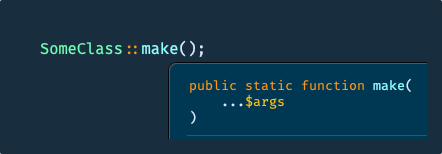Automatic autocompletion for make()
Introduction
The make() method is a common pattern in the Laravel ecosystem. Some might argue that it's no longer necessary since we can now chain methods directly after a new call starting from PHP 8.4. However, I believe it remains useful for resolving elements from the Laravel container.
You could place the make() method in a trait and apply it to all your classes while passing the arguments along. However, this approach would result in the loss of autocompletion.

<?php
class Action
{
public function __construct(
protected string $arg1,
protected string $arg2,
protected $arg3,
) {}
public static function make(...$args): static
{
return resolve(static::class, $args);
}
}
Consequently, you often end up duplicating your constructor code. This can become frustrating, especially with more than one or two arguments.
<?php
class Action
{
public function __construct(
protected string $arg1,
protected string $arg2,
protected string $arg3,
) {}
public static function make(
protected string $arg1,
protected string $arg2,
protected string $arg3,
): static
{
return resolve(static::class, [$arg1, $arg2, $arg3]);
}
}
Laravel Idea To The Rescue
Unfortunately, there is no built-in way for the IDE to automatically use the same arguments as the constructor. However, Adelf, the creator of Laravel Idea, quickly provided a solution. Laravel Idea offers a ide.json file that allows you to configure additional autocompletion for your project. While this is typically Laravel-specific, in this case, he added support for type-hinting constructor arguments in other methods.
To implement this, create the ide.json file in your project root, add the following JSON, and regenerate your helper code.
{
"$schema": "https://laravel-ide.com/schema/laravel-ide-v2.json",
"helperCode": {
"methodsWithConstructorParameters": [
{
"baseFqn": "App\\Traits\\Makable",
"methods": [
{
"name": "make",
"returnType": "static"
}
]
}
]
}
}
Reusable make() Method
The baseFqn also accepts parent classes or traits, allowing you to reuse this across your codebase. When using a trait, PhpStorm will display two definitions, however.

<?php
trait Makable
{
public static function make(...$args): static
{
return new static(...$args);
}
}
Supporting resolve()
Returning to the original example of passing arguments to resolve() to create a class via the Laravel container, you quickly realize that this approach doesn't always work. resolve() requires the parameter name as the key, so the simple version only works with named arguments, which are not always provided.
Fortunately, we can bridge this gap using Reflection to add positional arguments. The complete trait looks like this:
<?php
trait Makable
{
public static function make(...$positionalParams): static
{
$reflector = new ReflectionClass(static::class);
$constructor = $reflector->getConstructor();
if (! $constructor) {
return app(static::class);
}
$constructorParams = $constructor->getParameters();
$namedParams = [];
foreach ($positionalParams as $index => $value) {
if (is_string($index)) {
// This is already a named parameter
$namedParams[$index] = $value;
} elseif (isset($constructorParams[$index])) {
// This is a positional parameter - convert to named
$namedParams[$constructorParams[$index]->getName()] = $value;
}
}
return app(static::class, $namedParams);
}
}
Conclusion
So, this was quite some effort to avoid repeating the constructor arguments. Is it really worth it? I'll leave that decision to you, but I think it's cool that it's possible.
Loading replies…